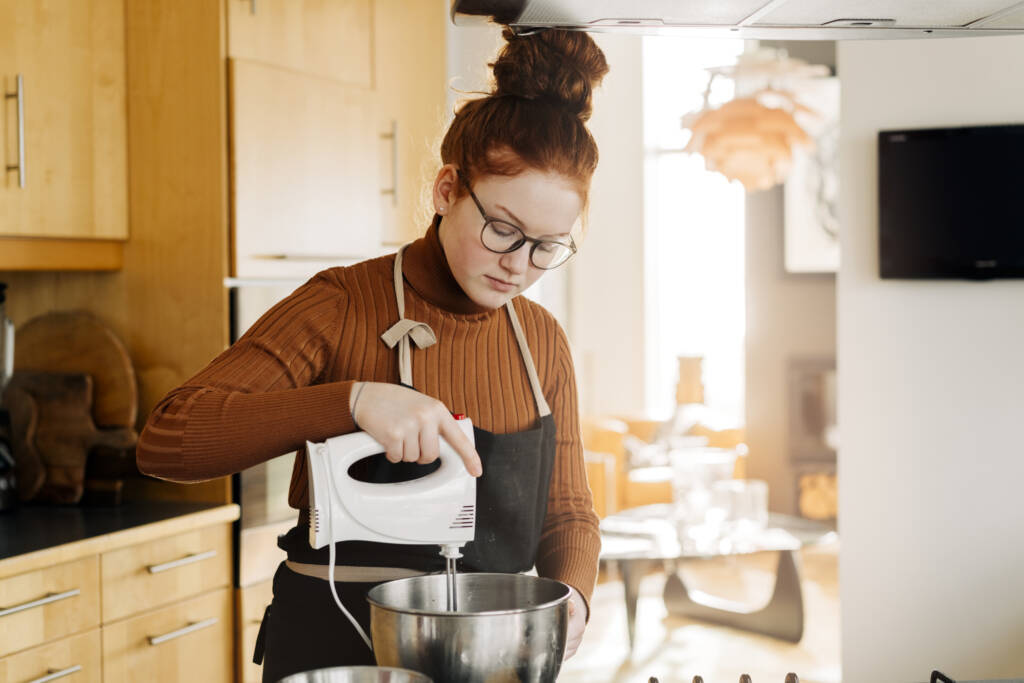
Culinary Arts 1b

Culinary Arts 1b: Finding Your Palate
Did you know that baking is considered a science? Building on the prior prerequisite course, discover how to elevate your culinary skills through the creation of stocks, soups, sauces, and learn baking techniques. Examine sustainable food practices and the benefits of nutrition while maintaining taste, plating, and presentation to truly wow your guests. The last unit in this course explores careers in the culinary arts for ways to channel your newfound passion!
This course has minimal opportunities to practice the skills and concepts discussed. If you are looking for an applied culinary class, please see Culinary 2, for which culinary 1 is not a pre-requisite.
During this course, you will learn career-related skills and earn a badge for this accomplishment. A badge is a digital certification of your career-related learning that you can share on social media and higher education platforms, or with colleges, potential employers, peers, and colleagues. Select this link to learn more about badges.
Major Topics and Concepts
Unit 1: The Healthy, Sustainable Kitchen
Describe the six major food groups and how they affect dietary health
Apply nutritional principles during food preparation and planning
Discuss the strengths and weaknesses of nutritional guidelines
Demonstrate healthy cooking techniques
Explain the importance of sustainability in the kitchen and how it can be achieved
Unit 2: Tools of the Trade
Describe the tools and equipment found in a commercial kitchen
Explain how to best select, use, and maintain kitchen equipment
Develop and use an equipment checklist in the kitchen
Discuss proper mise en place in a kitchen workstation
Unit 3: Stocks, Sauces, and Soups
Define the four essential components of cooking stock
Identify and describe the two classifications of soup
Discuss the principles of thickening agents
Explain the characteristics and derivatives of the five mother sauces
Unit 4: Baking: Breads, Cakes, & Cookies
Describe various baking methods
Identify the basic ingredients involved in baking
Explain the principles of food science in baking techniques
Discuss the ways baking is considered both a science and an art
Unit 5: Culinary Business and Entrepreneurship
Discuss the history and trends of the food service industry
Explain the procedures of purchasing, receiving, and issuing
Identify how entrepreneurs maximize opportunity
Describe various marketing strategies in food service
Unit 6: Service, Style, and Satisfaction
Differentiate between different types and styles of food service
Identify proper techniques for handling customer relations
Describe some methods of effective food presentation
Explain formal dining etiquette from the perspective of both a server and a customer
Unit 7: Choosing Your Culinary Career
Identify career and employment opportunities
Explain various steps in the career decision-making process
Discuss different levels of education and training required for food service
Describe ways to manage multiple roles and responsibilities
Unit 8: Networking for Success
Explain the significance of professional organizations in hospitality and food service
Create a personal leadership plan
Identify leadership and teamwork opportunities to enhance your professional skills
Name and define several prominent culinary associations
Competencies
The Healthy Kitchen
Students will demonstrate an understanding of healthy kitchens by explaining nutritional health, explaining healthy cooking techniques, and explaining nutritional principles in food preparation and planning.
Commercial Kitchen Tools
Students will demonstrate an understanding of commercial kitchen tools by creating a list of essential commercial kitchen tools, explaining the proper use of tools in the kitchen, and explaining mise en place in a kitchen workstation.
Liquid Building Blocks
Students will demonstrate an understanding of liquid building blocks by describing the essential components of soups, explaining the principles of thickening agents, and explaining the characteristics of mother sauces.
Baking
Students will demonstrate an understanding of baking by describing baking methods, explaining the principles of food science in baking, and explaining the science and art of baking.
Culinary Business
Students will demonstrate an understanding of the culinary business by describing food industry trends, explaining culinary business procedures, and describing marketing strategies in the culinary business.
Culinary Experiences
Students will demonstrate an understanding of culinary experiences by differentiating food service approaches, explaining customer relations techniques, and describing food presentation methods.
Culinary Careers
Students will demonstrate an understanding of culinary careers by explaining culinary career opportunities, explaining the required education for culinary careers, and describing culinary career responsibilities.
Networking in the Food Service
Students will demonstrate an understanding of networking in the food service industry by explaining teamwork opportunities, describing culinary professional organizations, and explaining the purpose of a personal leadership plan.

